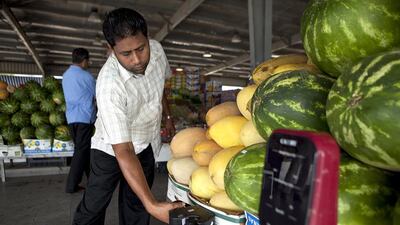UAE inflation hit 3.1 per cent in December, its second-highest level for five years, as housing inflation continued to increase, the National Bureau of Statistics said.
Fourth quarter inflation rose to 3 per cent, up from 2.6 per cent in the three months to September.
Housing and utilities costs increased by 5.4 per cent year- on-year, up from 4.4 per cent in November. Abu Dhabi has increased fees for energy and water use from January 1.
Furniture cost growth remained high, totalling 4.9 per cent in December, up from 4.7 per cent the previous month.
Recent reports from property analysts show housing cost inflation in Dubai levelling off, with some declines recorded in the last three months of 2014.
Government statistics usually lag the latest developments in the property market by a number of months, analysts said.
House price inflation in Dubai stands at 7.7 per cent. As the nation’s most populous emirate, rising housing costs in the city are driving up countrywide inflation figures.
Dubai’s high housing costs are also pushing up prices in nearby emirates, as more residents opt to commute from cheaper locations.
National food prices fell to 1.3 per cent from 2.1 per cent. Last year, the government announced a price freeze on 500 staple food products to take effect at the beginning of this year. Education costs continued to grow at around 4 per cent, as a shortage of school places sends fees up.
Domestic inflation accounted for the majority of price increases. Inflation in imported goods is likely to fall in coming months as a lower oil price reduces transport costs.
December annualised inflation stood at 4.2 per cent in Dubai, and at 4.1 per cent in Abu Dhabi. Statistics Centre Abu Dhabi predicts inflation in the capital will continue to increase in the first three months of the year.
The IMF predicts countrywide inflation of 2.5 per cent in 2015.
abouyamourn@thenational.ae
Follow The National's Business section on Twitter

